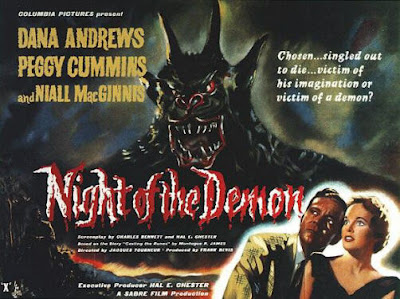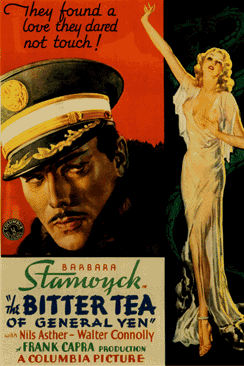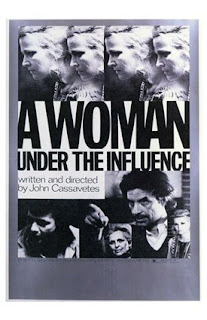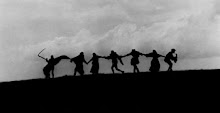Directed by: Jacques Tourneur
Written by: Charles Bennett, Hal E. Chester
Starring: Dana Andrews, Peggy Cummins, Niall MacGinnis
Black & White, 95 minutes
Grade: A

In the past, I've been a tad bit harsh on the films of Jacques Tourneur. You'll often find that many under-appreciated directors will garner a certain following of critics and movie buffs that do nothing but rant and rave about how good the filmmaker was, and how influential his films are. This is certainly the case with Tourneur, and so, when I watch one of his films, I am often disappointed. It's not really Tourneur's fault, it's mine for having such high expectations. Through the years I've read how his work with producer Val Lewton, which resulted in films like Cat People and I Walked with a Zombie, was so groundbreaking and scary. Those films weren't groundbreaking or scary, they were simply solid films that did a lot with a little, and rose above the usual B movie aesthetics. I've also read, many times, about how Out of the Past was the greatest noir film. This is not the case. Once again, Out of the Past is a tightly constructed movie that happens to incorporate every noir trademark there is. To call it the greatest of all noir would be to diminish the impact of Otto Preminger's Laura and Billy Wilder's Double Indemnity, which would be a grave mistake. So, feeling that I owed Tourneur something, at least another shot, I picked up Night of the Demon, a lesser known (in America anyway) horror film he made in 1957. And wouldn't you know it, I absolutely loved it.
Opening on images of Stonehenge, with a voice over narration that speaks of ancient runes and the power to summon the demons of hell, the film sucks the viewer in immediately. The mood is set, and Clifton Parker's eerie score begins to kick into high gear. A few moments later, Tourneur throws the viewer inside the car of a sweaty, panic-stricken professor named Harrington. He's fleeing someone, or something, but what, we don't know. He pulls up to a mansion in the country, vacates the car, and rushes to ring the doorbell. Inside, he speaks with a man named Karswell, and the two proceed with a very cryptic conversation. Harrington is now begging Karswell to stop what he has created, to call it off. Karswell assures Harrington that he will do what he can, and that everything will work itself out. Harrington, breathing a sigh of relief, exits the house, heading for his automobile, when out of the forest comes a puff of smoke, then a light. "It's in the trees! It's coming!" Harrington shouts at the top of his lungs, and then we see what has terrified him so: a giant, fire-breathing beast. It approaches Harrington, and then tears him to bits. Enter Dr. John Holden (Dana Andrews), American psychiatrist, resident skeptic, and expert myth debunker. He's halfway across the Atlantic in an airplane, on a mission to visit Professor Harrington, and to assist in an investigation on Karswell and his devil cult. Holden's plane touches down, and he gets the bad news about Harrington. Unable to let things go, Holden-joining forces with Harringon's niece, Joanna (Peggy Cummins)-continues with the inquiry into Karswell. This has Karswell feeling a bit perturbed, so he does what any good Warlock/Sorcerer/Dr. Strange would do, he puts a curse on Holden, predicting that he will die, just like Harrington did, in three days time. Being the nonbeliever that he is, Holden pays no attention to Karswell's mumblings, but then things start to get creepy, and it looks like Karswell's prediction may come true. But then an unlikely source of help comes in the form of Karswell's own mother. Is it too late? Is Holden's time at an end? Can they stop the hellish demon? You'll be quite surprised at the result when Tourneur brings the tension to a head on board a train car in the film's masterful finale.
The great thing about Tourneur is that when he shows up to play ball, he is a master of atmosphere and suspense. This is evident all throughout Night of the Demon, most notably in a startling seance sequence that practically lays the foundation for a similar scene in Poltergeist. The medium calls forth spirits from the dead, including Harrington, speaking in their voices, warning Holden of the dangers that lie ahead. Spooky stuff. Tourneur and his cinematographer Ted Scaife revel in chiaroscuro lighting that hides the real threats in the shadows, causing the audience to lean a little closer, to look a little harder at way may be lurking just out of view. The one exception is the monster, which is nothing short of ridiculous. At times, it reminded of Godzilla riding a tricycle, but truth be told, the monster isn't around all that much, and what there is of him was added to the picture despite Tourneur's protests. He knew it was better to tell than to show, and if he had had his way, the film would be a flat out masterpiece. In the end, though, Tourneur does come out on top. His talent is never in doubt, and the film holds up very well today.
Helping Tourneur tremendously, the cast never approaches cheesiness. The material could easily slip into the realm of the silly and the fantastic, but they keep straight faces, holding the audience in check. Peggy Cummins is solid as Joanna, a character that is equally worrisome and aggressive. Tourneur was never a director who let his female characters fall into the background or sit on the sidelines. His women were strong and maternal, and Cummins falls right in line. Niall MacGinnis has a ball with Karnswell, a demanding character, because he has to be able to frighten others while managing to retain his wit and charm. Obviously based on Aleister Crowley, Karnswell is the type of guy who can control the weather at will, summon power from Satan, and still do basic magic tricks for the local kids at a Halloween party. Through all of this craziness, Andrews is the audience's rock as Holden. One of the great, underrated actors of his generation, Andrews had a range that was incredible. He would leave an impression no matter what, whether he was doing minor work in films like The Ox-Bow Incident and Ball of Fire, or whether he was part of the main objective, the way he was in Laura and The Best Years of Our Lives. He's not well remembered today, mostly because he did a lot of B movies, like this one, but I've never seen him be anything less than superb. Here he has the task of showing us a man who is nearly infallible in his beliefs, but, slowly, he has to show us the gears of doubt and realization turning in his head. He succeeds. Holden is a man who has faith in the "touchable," and the "seeable," but the science that he has so resolutely fallen back on in the past is withering away, and without it, he is lost. It's a blast to watch Andrews squirm around, desperately searching for something to latch onto, something to rescue him from his nightmare.
You, however, won't want to be rescued from the spell that this film casts. Night of the Demon is a breathtaking, fast moving piece of work that really gets under your skin. It's a minor film in America's cinematic history, but it was a huge success in Britain, where it was funded and filmed. Stateside, it was truncated and released as Curse of the Demon, but the DVD restores both the American and British prints, proving, once again, how stupid Hollywood can be. This is one of those very rare films that can please modern horror fans as well as those who love the classics of yore. Tourneur, unlike Holden, was a true believer. After viewing this film, you will be too.


